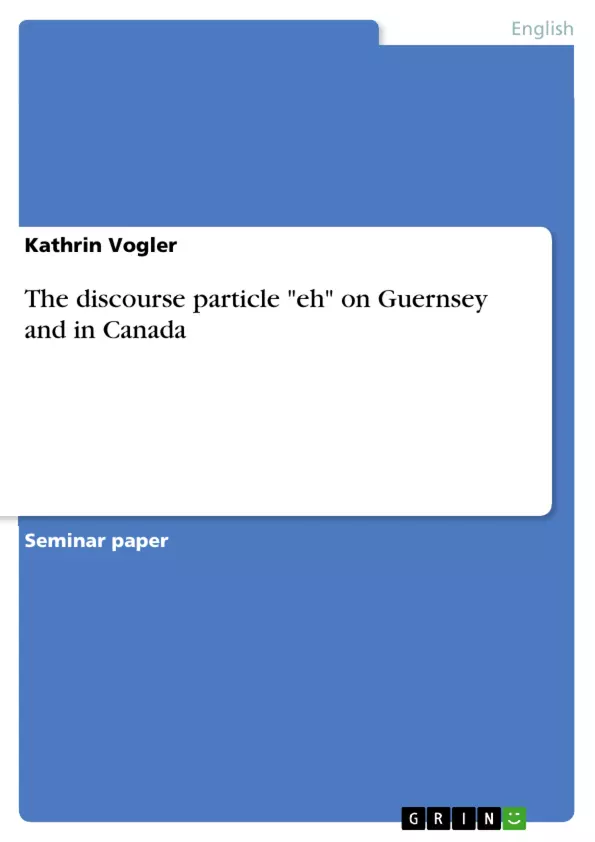The purpose of this paper is to give an overview on the discourse particle eh, which is frequently used on Guernsey and in Canada: How come, that the same particle occurs on the Channel Islands and in Canada? Where did it originate from? And what does Columbus mean when she says “discourse particles [like eh…] signal attitudes and beliefs to their interlocutors beyond the base utterance” (Columbus 2009:401)? Which kind of attitudes does she refer to? Or how can one little word have different covert meanings? And finally, how exactly does eh on Guernsey differ from eh on Canada?
These questions have occupied researchers since this little word came into focus. Especially during the last 35 years there has arisen a remarkably high interest in examining eh – its history, its presence in today’s use of language and its future. Strikingly, there can be found a lot of works referring to eh in Canada, but only two researchers have (successfully) committed themselves to exploring eh on Guernsey. This situation might as well hint at the fact, that many people, the majority is probably of Canadian origin, claim eh as a Canadianism, without admitting, or knowing, that it is also present in other English-speaking varieties.
The next part of this paper is therefore concerned with the origin of eh, whether it can be called a Canadianism or not and where it is used apart from Canada and Guernsey.
The third part is dedicated to the eh used on Guernsey: Chapter 1 names its most important pragmatic functions, before they are evaluated in Chapter 2 in form of a case study. Part 4 consequently deals with the Canadian version of eh whose, pragmatic functions are outlined in Chapter 1, and Chapter 2 provides a case study as well. According to the data collected so far, part 5 compares the pragmatic functions of Guernsey and Canadian eh and draws final conclusions concerning its origin and attitudes towards eh.
Part 6 concludes this paper by giving a short outlook on the future of eh.
Table of Contents
- I. Introduction
- II. The origin of eh
- III. eh on Guernsey
- 1. Syntactic and pragmatic functions of eh
- 2. A case study by Pauline Barbé
- IV. eh in Canada
- 1. Pragmatic functions of eh
- 2. A case study by Kathrin Vogler
- V. eh on Guernsey versus eh in Canada
- VI. Outlook
Objectives and Key Themes
This paper aims to provide a comprehensive overview of the discourse particle "eh," which is frequently used in both Guernsey and Canada. It explores the origins of this particle, its presence in different English-speaking varieties, and its diverse pragmatic functions.
- The origins and history of the discourse particle "eh."
- The debate surrounding the designation of "eh" as a Canadianism.
- The syntactic and pragmatic functions of "eh" in Guernsey and Canada.
- Comparative analysis of "eh" usage in Guernsey and Canada.
- The future of "eh" in English language usage.
Chapter Summaries
- I. Introduction: This chapter introduces the topic of "eh" and outlines the key research questions addressed throughout the paper. It also highlights the significant interest in examining the particle and its evolution in contemporary language.
- II. The origin of eh: This chapter explores the origin of "eh" and examines whether it can be classified as a Canadianism. It analyzes historical evidence and references to "eh" usage in various English-speaking regions, including Canada, Guernsey, and beyond.
- III. eh on Guernsey: This chapter delves into the usage of "eh" on Guernsey. Chapter 1 outlines its syntactic and pragmatic functions, while Chapter 2 presents a case study analyzing specific examples of its usage.
- IV. eh in Canada: This chapter examines the usage of "eh" in Canada. Chapter 1 outlines the pragmatic functions of "eh" in Canadian English, and Chapter 2 presents a case study exploring its usage in specific contexts.
- V. eh on Guernsey versus eh in Canada: This chapter compares the pragmatic functions of "eh" in Guernsey and Canada, drawing conclusions about its origin and the attitudes surrounding its use in both regions.
Keywords
This paper focuses on the discourse particle "eh," its origins, its presence in various English-speaking varieties, and its pragmatic functions. Key terms and concepts include: Canadianism, discourse markers, syntactic and pragmatic functions, case studies, comparative analysis, and linguistic variation.
Frequently Asked Questions
Is the word "eh" a Canadianism?
While many claim it as Canadian, "eh" is also a significant part of the English variety spoken on Guernsey and in other regions.
How does "eh" on Guernsey differ from "eh" in Canada?
The paper compares the pragmatic and syntactic functions in both regions, showing subtle differences in how attitudes and beliefs are signaled.
What are discourse particles?
They are small words like "eh" that signal attitudes and beliefs to interlocutors beyond the literal meaning of an utterance.
Where did the particle "eh" originate?
The text explores the history and origins of "eh," investigating its presence across different English-speaking varieties.
What are the pragmatic functions of "eh"?
Functions include seeking confirmation, softening a statement, or ensuring the listener is still following the conversation.
- Arbeit zitieren
- Kathrin Vogler (Autor:in), 2010, The discourse particle "eh" on Guernsey and in Canada, München, GRIN Verlag, https://www.grin.com/document/164589



